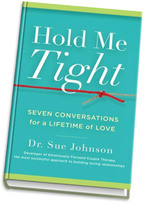A couple's ability to stay emotionally engaged and responsive in the face of difficulty predicts marital satisfaction and stability......
Time Heals?
Remember the old adage "time heals"? Well, simply letting time pass is not likely to heal the distress and wounds of marriage. Research tells us that marital problems generally do not spontaneously improve. By the time couples separate or divorce, they have experienced on average 6 years of relationship deterioration. Couples who are experiencing marital problems are well advised to spend time and energy on improving the quality of their relationship. Here are other interesting facts we know from research about marriage and family life:
- 70% of couples experience a dip in their feelings of relationship satisfaction after the birth of a child.
- 30%-50% of couples experiencing marital problems have a partner who is clinically depressed.
- Contrary to popular wisdom, it is feelings of estrangement, isolation and loneliness that are the driving force causing marital separation and not conflict or anger.
- A man's health seems to benefit from his just being married. A women's health seems to benefit from having a positive relationship (one where she can confide in her partner).
- 85% of those partners who clam up and won't talk during marital conflict are men. Women, on the other hand, are more likely to pursue issues even in the face of increasing conflict.
- About 45% of children exposed to severe marital hostility (violence) exhibit extreme behavior problems. This is about 500 times the behavior problem rate in the general population.
- mood issues such as anxiety and depression
- alcohol abuse
- anger and aggression
- inappropriate outside relationships
- financial issues
- parenting differences
- sexual differences and dysfunction
- friends and family issues
- interests and leisure time differences
When to Seek Help?
The line is very thin between when partners experience a relationship as "troubled" and when they experience it as "too late to work on." For example, a husband may be surprised when his wife decides to leave. He may have ignored the warning signs and decided to wait to address the marital problems, hoping they would go away. But he is shocked when the divorce process unfolds very quickly and his partner decides that it is too late, gives up and leaves. Couples are well advised to heed the warning signs of marital estrangement and work on their relationship early. When couples are making efforts to improve their relationship but are not making progress by themselves, they should consider working with a professional marriage therapist before one partner gives up.
How Can Therapy Help?
The therapist can help guide you and your partner along the path toward building a safe and responsive connection. He will help you identify repetitive negative behavioral patterns, and the feelings that underlie them. The therapist provides a safe atmosphere to help each partner express those feelings and to facilitate listening and acceptance between partners. The therapist's role is to help the couple learn how they have become stuck and unable to make connection and how they can build on their own resources to reconnect. The therapist is also trained to help couples with special issues including aggression, substance abuse, affairs, depression, sexual issues and parenting concerns. When shopping for a therapist to assist you with your relationship, make sure that you make a wise investment. Finding the right Couples Therapist with the right approach can be very important when turning for help. A poorly trained and/or a not very skillful therapist may cost you the only chance you have at improving your connection with your partner. Make sure that you make it count.




